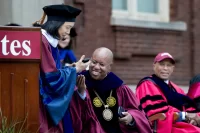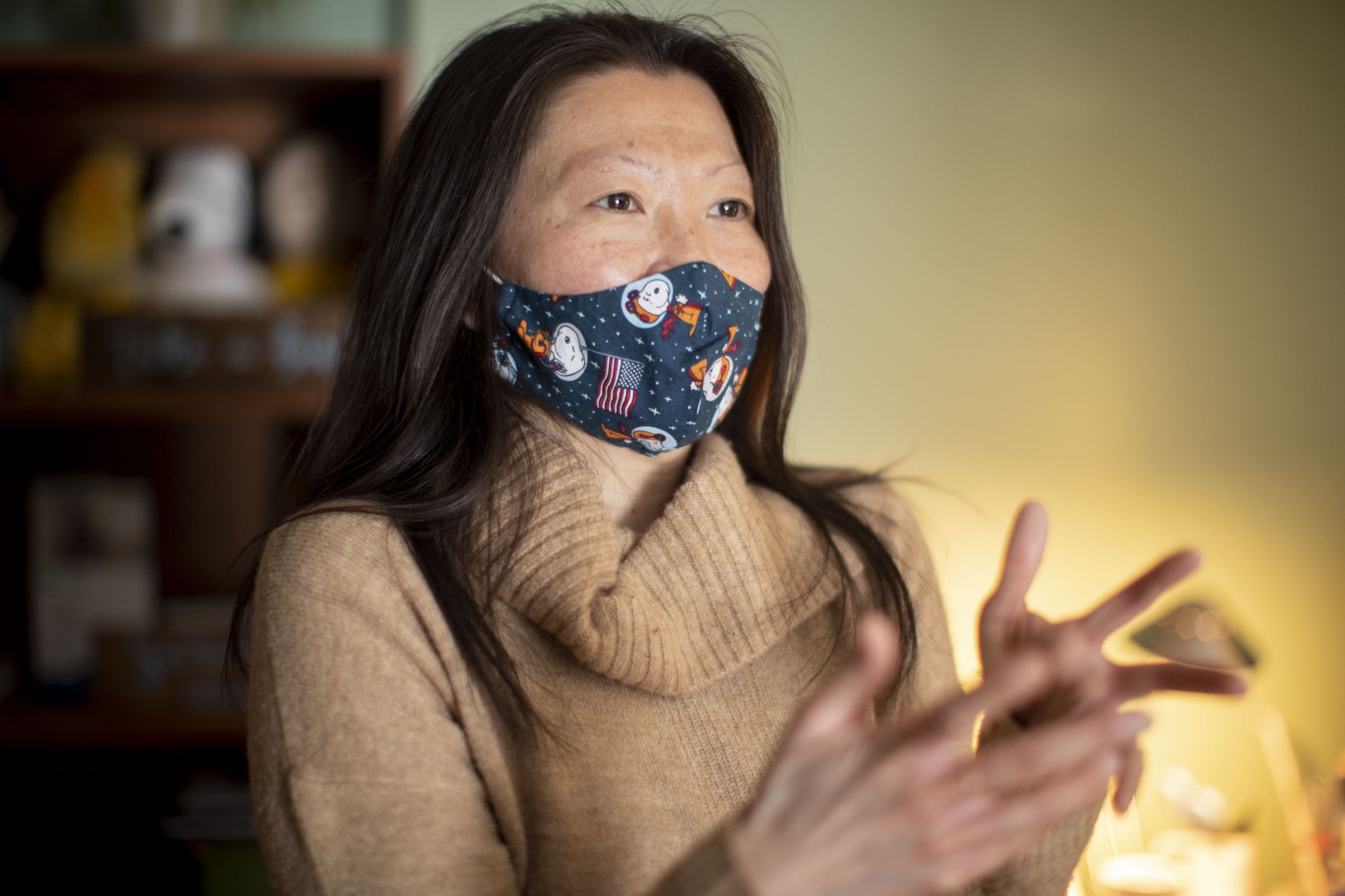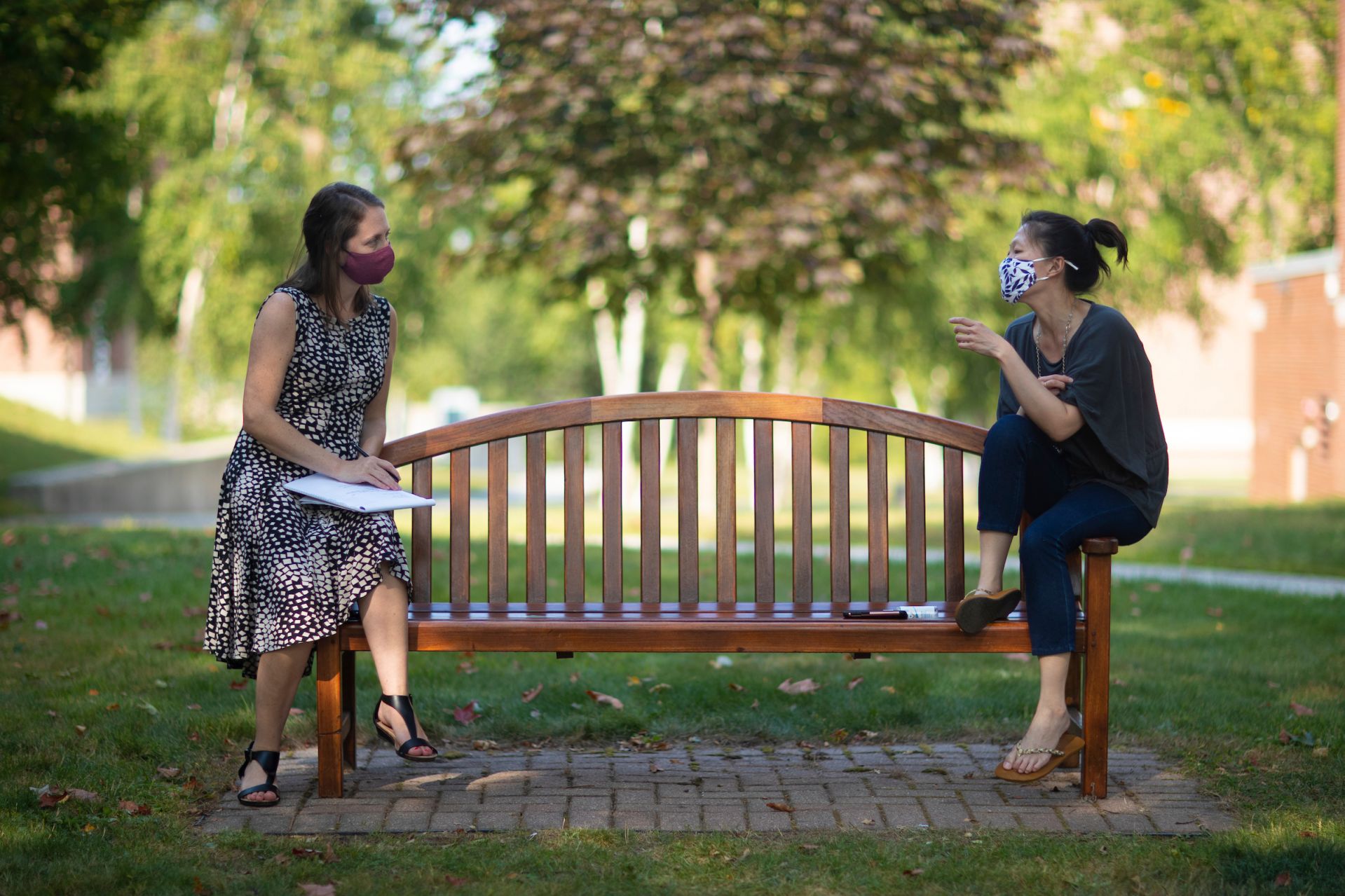
One of the things that I say to every Bates student I meet is that, whatever it takes, know yourself and know yourself well.
Engage in the critical self-reflection that’s necessary to really know who you are, who you’ve been, and who you want to be. So often we go through the motions of life not thinking about what exactly we’re doing and why exactly we’re doing it. And then we wonder why we feel unfulfilled.
Life is hard enough — why live it with less intention, meaning, and purpose than we have to? It can be difficult to look inward and think deeply about our whys. Sometimes it’s because we’ve never done it so we don’t know how, sometimes it’s because we’re worried about what we’ll find or not find. And yet, it’s through knowing the whys that we find clarity, direction, and focus.
Baccalaureate Address
Hoi Ning Ngai of the Bates Center for Purposeful Work delivered this address during the virtual Baccalaureate Service on May 23, 2021. An associate director of employer engagement and business advising with Purposeful Work, Ngai also serves as an interim associate dean of intercultural education. The Baccalaureate speaker is chosen by the senior class.
As you reflect on your own lives and next steps, and because you don’t all know me yet, I thought I’d share a few thoughts and confessions that you may find helpful — or at the very least sufficiently amusing. I hope you’ll get a sense of my whys as well as who I am, who I’ve been, and who I want to be.
You may (and probably should) ask for advice and guidance from others, but you should always be the final arbiter of your own destiny.
To start, I’ll confess that I’ve always wanted a tattoo. Of course, my pain threshold is pretty much non-existent, so it still hasn’t happened yet. But I’m only 42, so there’s still plenty of time, right? Specifically, I’ve always wanted a tattoo of a compass, on the back of my neck, with the needle pointing upward. It’s because I know that I am my own true north — and you are yours.
You may (and probably should) ask for advice and guidance from others, but you should always be the final arbiter of your own destiny. As soon as you relinquish your decision-making power, you take a back seat to what could be an amazing journey of your own design. Even if you run into challenges along the way, don’t let anyone else take the steering wheel. All of the bumps and detours — they will test you. How you respond to them and what choices you make ultimately contribute to a narrative, a story, a life that’s truly yours.
If I listened to everyone’s “You must do this” or “You can’t do that” — I’m not sure I’d feel quite as empowered as I do at this point in my life.
I’ll confess that I don’t know how to drive, so I really should avoid all car and road references since I honestly have no idea what I’m talking about. I used to have the line: “I’m so excited to learn how to drive in Maine” in my bio. Six months ago, I specifically asked my colleague Sheila to remove that line. At some point during the pandemic, I decided that I simply don’t care enough. I’m a free and independent spirit — a Sagittarius born in the year of the horse — so not knowing how to drive has definitely limited how far I’ve been able to go.
However, I’ve been able to see more of the world without a license than most would ever think possible. More importantly, I have other things that I’d rather do with my time. As this crazy and intense year has shown us, you never know what life will bring, so you need to figure out what your priorities are, separate from what everyone else has to say. If I listened to everyone’s “You must do this” or “You can’t do that” — I’m not sure I’d feel quite as empowered as I do at this point in my life. For now, my priorities are: finding community, building relationships, and making friends. And y’know what? They all have cars!

I’ll confess that I’ve always been afraid of public speaking. I literally cried when I had to memorize two lines for my fifth-grade play — a play that neither I nor my classmates nor our parents remember the title of three decades later. In school, I hated getting randomly called on in class. At work, I hated making presentations, especially to strangers. I either talked way too fast, jumbled my words, or sounded like a robot. Or some combination of all three.
Unlike driving, though, public speaking is something I’ve always wanted to get better at. I mean, it literally shows up in every aspect of my personal and professional life. And if I’m being completely honest, I know that 1) I have a dramatic streak and 2) I’m a bit of a ham.
When something matters enough, you’ll do what you need to. And even if it’s not always the best show, try to make it your best effort.
So I took a deep breath and then a deep dive straight into the fear. While I was in grad school, I became a fitness instructor, because what could be more terrifying than having 30 people staring at you, in a wall of mirrors, for 60 minutes? On one occasion, I completely crashed and burned on a routine. No one knew what was going on — including me. It was an epic fail, but no one got injured (thankfully) and the entire class was really supportive. And despite the embarrassment, even I couldn’t help laughing about it.
When I worked at Penn, I signed up for Acting 101. We could take one class for free every semester and this was the motivation I needed. I still remember the shock — and thrill — of being able to memorize 10 whole minutes of dialogue with my scene partner Adriana, a junior who was incredibly patient whenever she sensed my anxiety level rising. I can’t say public speaking has gotten that much easier over time, but I’ll own all of the progress I’ve made since that fifth-grade play. When something matters enough, you’ll do what you need to. And even if it’s not always the best show, try to make it your best effort.
I’ll confess that I hate grass. Especially live grass. With bugs. I grew up in the urban jungle of New York City, where I spent more time on concrete pavement than dirt roads. My family was poor, so I never had the chance to go to sleepaway camp or get exposed to nature in a way that was deeply impactful. So it meant a lot to be able to go away to Dartmouth for college. I couldn’t wait to escape the noise and pollution of the big city for the fresh air and mountains of New Hampshire. I also love snow, so I was always so excited for the first snowfall of the year. Of course, when the snow melts and spring arrives, the grass comes out.
You may have people who dismiss you for your quirks and idiosyncrasies, but the ones who love you are the ones who’ll allow you to be who you are and make space for your strange and special qualities.
So when I say I hate grass, I really mean it. I hate walking in it. I hate sitting in it. I don’t even like the smell of it. One spring, my best friend, Derek, really wanted me to watch him play ultimate frisbee on the green. Of course, I immediately said no. And he knew exactly why. It’s not like he’d never teased me about it, but he certainly never made me feel bad about it either.
So what did he do? He found the biggest blanket he could find. In my fuzzy memory, it seemed as big as a 10-foot square. He laid it out on the grass and had me sit right in the middle of it. Just me in a sea of blanket. You may have people who dismiss you for your quirks and idiosyncrasies, but the ones who love you are the ones who’ll allow you to be who you are and make space for your strange and special qualities. No strings attached.
I’ll confess that I love shooting. Ever since I met my first-year hallmate Doug, who shot and hunted regularly with his family in Montana, I’d really wanted to try it. Of course, it’s not something everyone wants to do and back then I wasn’t sure about doing it on my own — I mean, it’s not really a city girl hobby. So when I visited my friend Victor from grad school at home in Texas, he made sure the local shooting range was on my itinerary.
Like Doug, he’d also grown up shooting, so he was comfortable showing me the ropes. Despite being petite and lightweight myself, to everyone’s surprise, I preferred shooting the .45 — a higher-caliber gun — where I could feel the weight and recoil more intensely. I also hit the bullseye multiple times from 100 yards away.

For a long time, I used to ascribe that to beginner’s luck, but after shooting more regularly, I realized that I’m pretty good. It’s because I’m careful, and focused, and committed. Over the last six years, I’ve taken group classes, gotten private lessons, and worked on my accuracy and precision. During the pandemic, I even got the chance to shoot a rifle, which had been on my to-do list for some time.
For me, being able to shoot isn’t about causing harm or inflicting pain. It is however about flipping the script on who I can be and what I can do.
Let’s be clear. As a 5-foot-2-inch Asian woman, I navigate a multitude — a multitude — of gender and racial stereotypes every single day — ones that constantly frame me as quiet, passive, and weak. And whether the world admits it or not, these stereotypes exist, and they persist, and they continue to impact how others experience me and how I experience them. And because I don’t subscribe to all of the assumptions, presumptions, and norms applied to me, I simply want everyone to know that I’m a boss. For me, being able to shoot isn’t about causing harm or inflicting pain. It is however about flipping the script on who I can be and what I can do. Whenever I have the chance, I make it a point to challenge the expectations of the world. I strive to be and do more because I know that I can.
I’ll confess that I’m terrible at poker — and anything that requires deception. I wear all of my emotions on my face — from delight to disdain, from glee to gloom. I can’t bluff, I can’t lie, and if you deserve it, I definitely won’t hesitate to give you side-eye. Whether I’m extremely excited or deeply disappointed, I don’t want to hide it. At the end of the day, authenticity is my deepest of values, and all I ever want is to be wholly me. I want to say what I’m thinking and what I’m feeling. I don’t ever want people to wonder what’s on my mind.
You have to accept your voice for what it is and what it can do. Embrace it, own it, and use it — hopefully to make the world a better place.
Of course, that hasn’t always won me favors, or friends, or followers. Not everyone wants to hear the whole truth and nothing but the truth, especially when it’s criticism. You can always work on your diction and framing, your timing and tone. At some point though, you have to be comfortable with your voice and saying what you need to say. You may not always get the response you want and you have to figure out how to navigate that possibility, but you have to accept your voice for what it is and what it can do. Embrace it, own it, and use it — hopefully to make the world a better place.
I hope these confessions have helped you get to know me a little bit better and what I care about. I share them with you earnestly because I want you to be comfortable embracing all of the ways that you’ve grown, all of the ways that you’re still growing, all of your strange and special qualities, and all of the people who love you for them.
As I like to say, there’s nothing between the lines — what you see is what you get. But if a summary would be helpful, here’s what I hope you heard:
- Believe in yourself and write your own story. There’s only one author.
- Set your own priorities. Do what you want. Achieve what you want.
- Embrace your fears and become a better version of yourself in the process.
- Find people who love you just the way you are. Keep them around.
- Be fierce and exceed the expectations the world has for you.
- You have one life, one truth, and one voice. Do good with them.
I’m so excited for what the future will bring you as you find your meaning, your purpose, and your pathway. I hope that you’ll keep us updated as you imprint yourselves on the minds and hearts of those who have the honor of meeting and knowing you.
Cheers to your success in the world!




